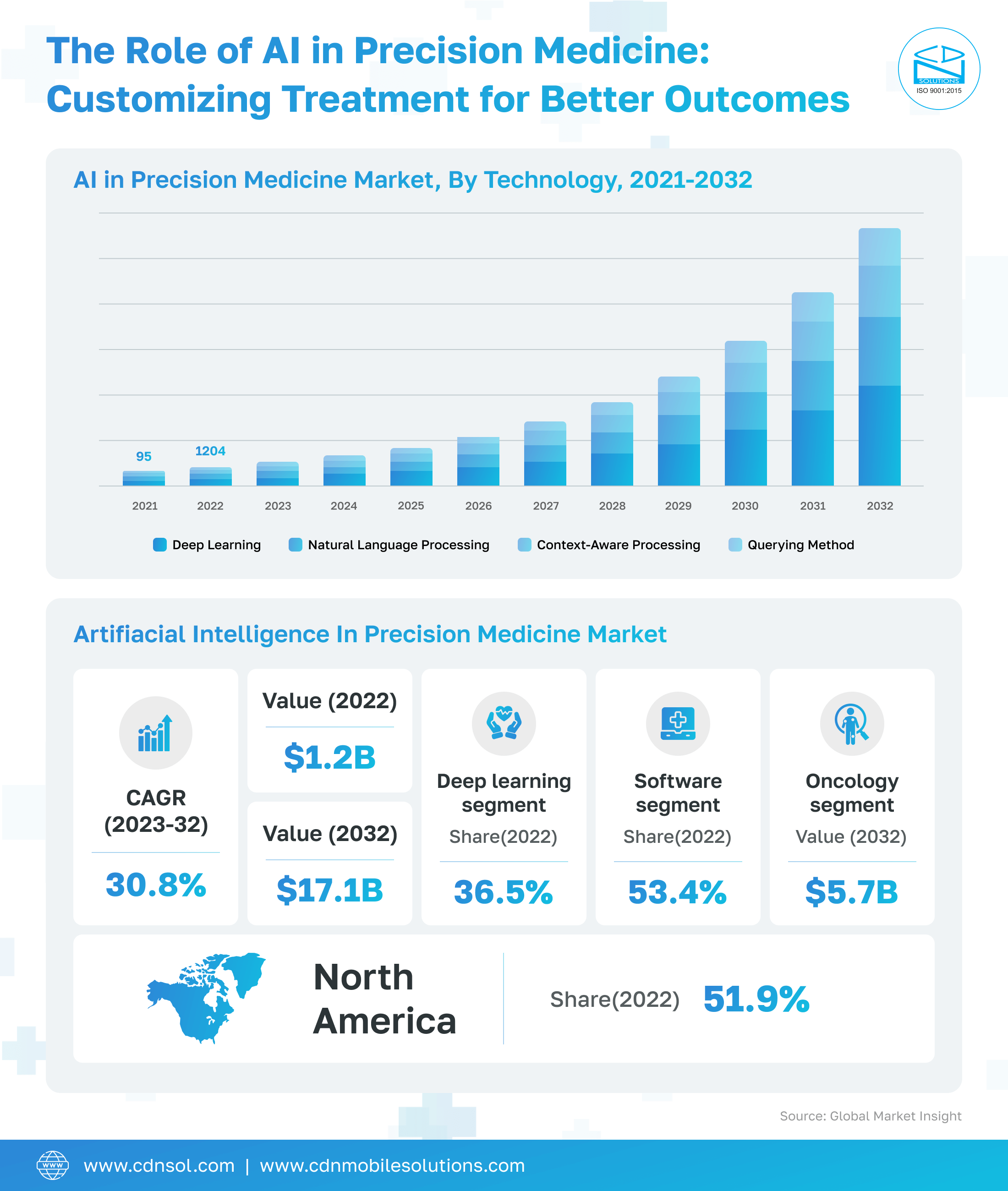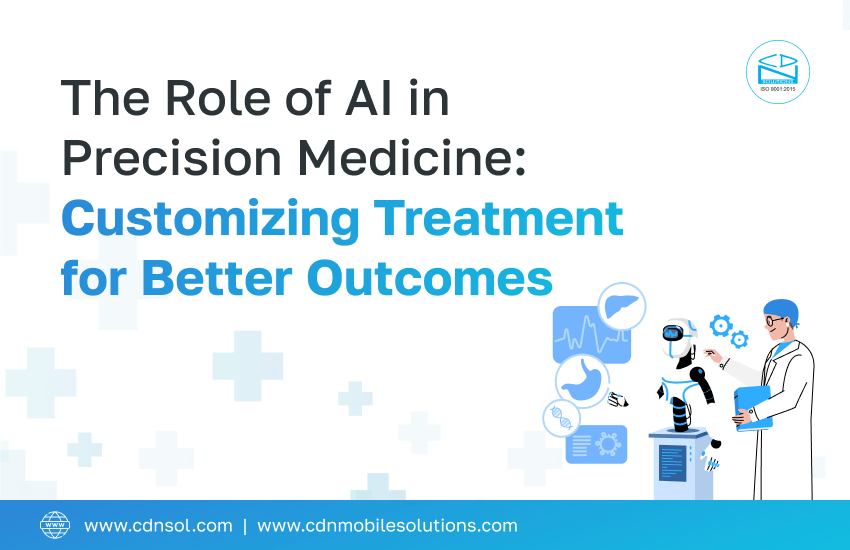Precision Medicine or Personalized Medicine is moving health care from a “one-size-fits-all” model. Treatments are now tailored to specific individual needs and circumstances. Personalized medicine leverages patient data to improve treatment efficacy, minimize side effects, and enhance patient outcomes. AI drives this transformation to a more personalized level by making data more informative for caregivers to use and taking treatment options to a higher level.
It has also been referred to as precision medicine, a medical practice that proposes treatment based on the particularized characteristics of the patients- everything from genetics to environments and even personal health history. AI integration in personalized medicine revolutionizes complex data processing and analysis for customized treatment design with much higher accuracy. With AI-powered precision health, doctors and healthcare professionals can offer better treatments, improve outcomes, and reduce trial-and-error approaches to care.
The infographic below highlights the growth of AI technologies in the precision medicine market. Advancements like deep learning, natural language processing, and context-aware processing are shaping the future of healthcare.

Source: Global Market Insight (https://www.gminsights.com/industry-analysis/artificial-intelligence-in-precision-medicine-market)
Table of Contents
Explore the expanding role of AI in precision medicine and how it’s set to drive innovation in the coming years.
AI and Genomic Medicine
Genomic medicine is the basis of personalized health care. Translating those genomic data into clinically meaningful insights falls squarely in the AI domain: identifying genetic variations that either predispose patients to certain illnesses or influence their response to targeted therapies. Powered by AI, precision medicine software can chomp through massive genomic sequences, mining billions of data points that correspond with mutations contributing to cancer, heart disease, and other illnesses. A deeper understanding of which genetic markers an individual possesses that relate to specific diseases or other conditions allows doctors to tailor a treatment plan to be both more effective and specific.
The AI capability is brilliance unparalleled in genomic medicine. It allows for extensive genomic data analysis for disease risks, genetic variations that affect treatment modalities, and early diagnosis by studying genetic predispositions to certain illnesses or diseases. This enables AI to help health providers give more precise and personalized interventions because of the enhanced comprehension of genetics.
AI-Powered Drug Development and Optimization
With its immense ability to process volumes and speeds of data, AI has become an indispensable tool for drug discovery and optimization. Applications in personalized medicine started using AI for predictions of how different patients might respond to certain drugs, a function that will increase the speed with which new treatments will be found. Genetic and molecular data are analyzed to guide developing drugs according to an individual’s genetic profile, thus optimizing effectiveness while repressing adverse effects.
Predictive Analytics in Personalized Medicine
The key to that, thus, lies with AI-driven predictive analytics for predicting outcomes in individual patients and sculpting treatments that can match such predictions. Run through historical and real-time data, AI can predict the course a disease will take or how a particular patient will respond to a specific therapy. Such predictive models enable health providers to take early interventions and customize treatments best suited for the patient’s unique condition, thereby enhancing effectiveness in care.
AI in Personalized Cancer Treatment
One of the most promising domains in personalized medicine, the treatment of cancer is being considerably complemented by offering ever more personalized therapies with AI. It enables the oncologists to choose the optimal treatment strategy by examining tumor profiles and genetic mutations. This would include choosing optimal chemotherapy or targeted therapy and then modifying treatment plans considering the variations in time. Applications of AI in personalized cancer treatment are also extending to develop precision immunotherapies that utilize the immune system of a patient to fight cancer in a much better way.
AI and Precision Diagnostics in Personalized Medicine
Precision diagnostics are part of personalized medicine, where the process of diagnosis refinement has been highly facilitated by AI. The diagnostic tools with the use of artificial intelligence examine detailed patient data, including imaging scans, blood tests, and genetic material for more accurate and timely diagnoses. Precision diagnostics are used in personalized medicine, which enables health professionals to identify a disease at an early stage and thus prescribe appropriate interventions that ensure better outcomes of treatment and improve satisfaction among patients.
AI in Monitoring and Adjusting Treatment Plans
AI-powered real-time monitoring heralds a new era in personalized medicine. Through wearable sensors, this invention provides details on the continuous health status of patients and dynamic updates of treatment plans. This invention reduces hospital visits and furthers the reach of remote healthcare access. The algorithms developed through AI permit health professionals to assess enormous volumes of data, recognize trends, and establish applicable recommendations. Ultimately, this invention will facilitate better patient outcomes and simplify care delivery.
Read more: The Impact of AI in Healthcare: Transforming Patient Care and Operational Efficiency
Ethical Issues in AI-Driven Personalized Medicine
Since the integration of AI into personalized medicine offers enormous promise, it also raises ethical dilemmas that will have to be weighed with much consideration. First among these are issues of patient privacy. Given that AI operates on large volumes of data, security, and confidentiality, it raises the issue of personal health information. Besides this, biased AI algorithms can perpetuate existing inequities in healthcare if not painfully addressed. The immediate call now is to develop regulatory frameworks that will guarantee the promotion of transparency, equity, and accountability on the AI-driven personalized health platform.
Key Ethical Considerations in AI and Personalized Medicine:
- Protection of Patient’s Privacy and Ensuring Security of Sensitive Health Information
- Potential Biases in AI Algorithms must be addressed
- Ensuring Equity to Access AI-powered personalized treatments.
Challenges and Opportunities in AI-Powered Personalized Medicine
Yet, not all challenges have been surmounted, despite the transformative potentials of AI in personalized medicine. The integration of AI into existing healthcare systems can be cumbersome, apart from the high investments that are needed in infrastructural development and training. In addition, other concerns are raised by regulatory approval and standardization of AI tools within clinical settings. Yet, the opportunities are limitless, as more sophisticated algorithms will allow for even more precise treatments in the future, leading to superior patient outcomes with reduced costs related to healthcare.
| Challenges | Opportunities |
| Integration of AI with the present workflows within healthcare. | More advanced AI models push personalized treatments forward. |
| Regulatory barriers for the approval of AI-enabled tools. | Economical health care due to the therapy developed by AI is efficient. |
| Scalability of the solutions developed for personalized medicine. | Democratization of AI-powered personalized care for better health worldwide. |
Also read: AI in Diagnostics: Improving Accuracy and Speed in Patient Care
Conclusion
AI is becoming part of personalized medicine. The whole field now sees a completely new way of diagnosis, treatment, and management of patients by health professionals. Ranging from genomic analysis powered by AI, AI integration presents large benefits that make healthcare more precise, efficient, and effective, to real-time patient health monitoring. Indeed, growing growth in this area puts a high burden on serious reflection of ethical and regulatory considerations so that AI-powered personalized medicine is safe, equitable, and available to all. Innovation will mark a new future in precision medicine with AI, bettering health outcomes.
The next piece in this series will be AI in Healthcare Administration: Cutting Costs and Increasing Efficiency. Watch this space!

